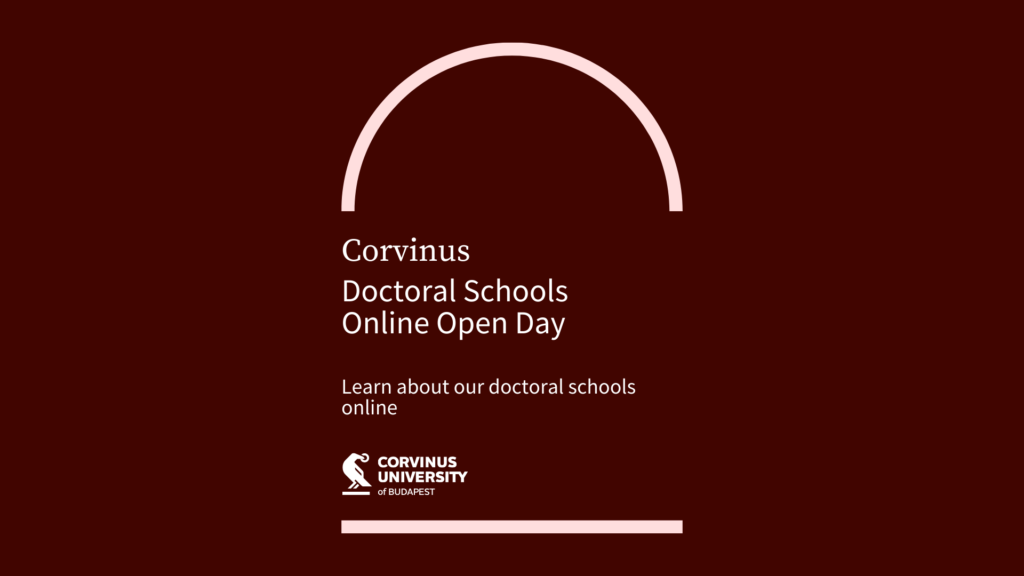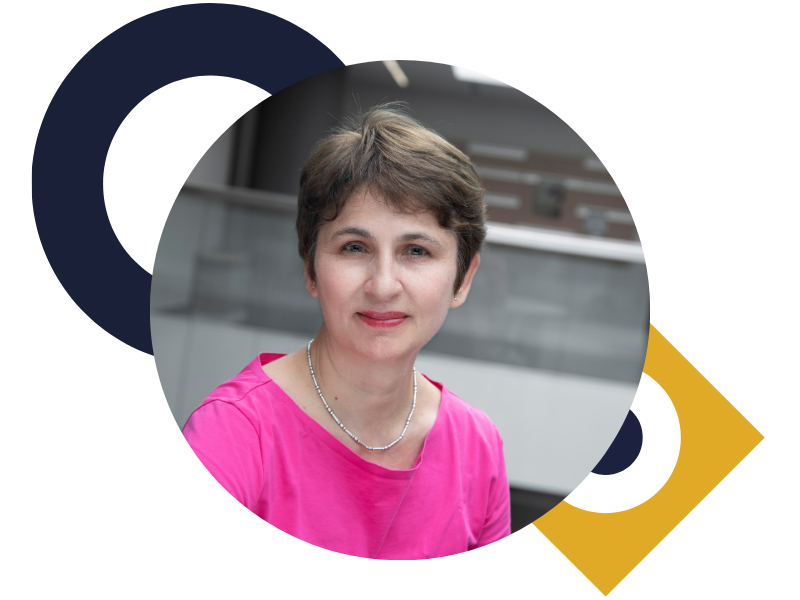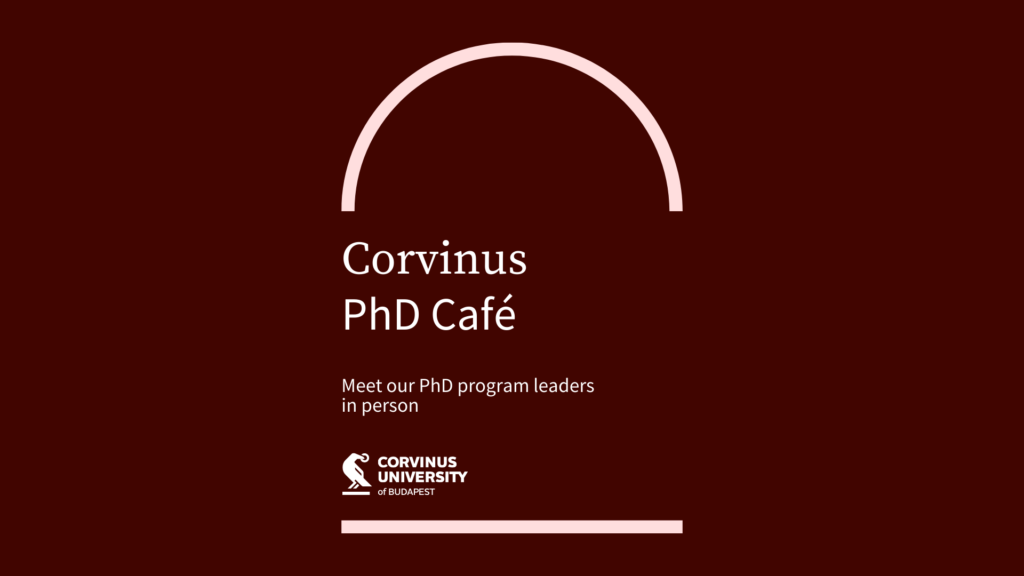
Corvinus Doctoral School’s Online Open Day 2025
Are you interested in a PhD? Do you have questions about admissions? Join our Online Open Day, where the heads of our doctoral schools will share their insights and we will answer your questions!
The Sociology Doctoral Program at the Corvinus University of Budapest aims to assist motivated students to carry out problem-oriented, theoretically grounded and methodologically sound empirical social research. The Doctoral Program prepares its students for the international labor market. In order to develop the careers of our students, the organized doctoral training is conducted in English. The training program is full-time and lasts eight semesters. In addition to the continuous research work, course work must also be carried out in the first two years. The first two academic years end with the comprehensive exam focusing on the defence of the research plan. In the second phase of the training – also four semesters – students work exclusively on their research and dissertation. The dissertation must be submitted for defense within three years after passing the comprehensive exam. The language of the dissertation must be English.

Head of Doctoral Program

Head of Doctoral School

Are you interested in a PhD? Do you have questions about admissions? Join our Online Open Day, where the heads of our doctoral schools will share their insights and we will answer your questions!

Subscribe to our newsletter to automatically receive the latest information on further education and admissions!
Society shapes our lives in countless ways, from everyday interactions to global structures. If you are curious about how social processes, institutions, and inequalities influence the world around us—and how we can study them systematically—then this is the doctoral program for you! We place great emphasis on fostering a supportive and collaborative doctoral community, where students can engage with peers, share ideas, and develop their research in a stimulating environment. Join our innovative academic community, where critical inquiry, innovative research, and interdisciplinary perspectives come together to explore the complexities of social life!
The Sociology PhD program at our department offers a vibrant research environment where faculty members investigate pressing contemporary social issues with global relevance. Research on protest cultures and political mobilization in Hungary and abroad sheds light on contemporary protest movements. Higher education, social mobility, and international student migration are also key areas of inquiry, contributing to debates on equity and inclusion. Research on the societal impacts of artificial intelligence examines ethical concerns, power dynamics, and how AI is shaping the future of work. Another key area is gender and work, including women’s advancement in academia, executive search, and the impact of intensive motherhood during the pandemic. Research on gender and migration addresses care migration, human trafficking, and the sexcam industry. The department also fosters cutting-edge research on migration, exploring barriers to immigration, the role of inequality in shaping migration policies, and how representations of migrants influence public opinion. Additional areas of expertise include corruption and EU funding, economic sociology, intergenerational welfare transfers, digital behavior and social media use, and media sociology. Our department provides an intellectually stimulating space for PhD candidates eager to engage with contemporary social challenges.
Applicants may propose a research topic that aligns with those listed for our doctoral school at doktori.hu, where available topics are continuously being updated, or choose any sociology-related topic of their interest. Our department maintains an extensive network of highly qualified professionals who are available as supervisors across diverse research areas. If a doctoral student’s project requires external supervision, we actively seek the most suitable expert and have a strong track record of successfully securing external supervisors when needed.
Given our vast experiences on the progress of doctoral students, the key feature of the sociology doctoral program is a strong focus on supporting the doctoral research. All courses focus on developing research skills.
The mandatory courses include
Students should take at least three elective classes. We offer courses in both quantitative and qualitative research and data analysis methods. Students are free to select other courses from the offers of other doctoral programs and even summer schools instead.
Continuous work on the doctoral research is a must. Students are expected to
In case of any questions, feel free to email Lilla Vicsek, the director of the Sociology Ph.D. program: lilla.vicsek@uni-corvinus.hu.
General information
• Applicants are required to submit a research plan in the English language. The oral interviews are conducted in English.
• The expected length of the research plan to be submitted during application: a minimum of 10,000, but not more than 20,000 characters including references.
• If an applicant selects both tracks, the Head of the DS and the Admission Boards shall decide which track is competent to conduct the admission procedure. If both tracks are deemed competent, the applicant may participate in both admission procedures. In that case the applicant may submit two research plans.
The Admission Board of each track shall:
• review and evaluate past achievements documented in the application materials (educational achievements, research experience, publication output, whether the completed education matches the track);
• review and evaluate the submitted research plan (maturity, relevance of research topic, whether it matches the doctoral track’s professional profile);
• conduct face-to-face or online interviews as means to assess the language skills, communication skills and professional competence of each applicant.
Andrew Ryder (egyetemi docens, ELTE TK)
Bozsonyi Károly (egyetemi docens, KRE BTK)
Durst Judit (tudományos munkatárs, Társadalomtudományi Kutatóközpont)
Géring Zsuzsanna (tudományos főmunkatárs, BGE)
Hegedűs József (ügyvezető igazgató, Városkutatás Kft)
Kaló Zsuzsanna (egyetemi docens, ELTE PPK)
Messing Vera (tudományos főmunkatárs, Társadalomtudományi Kutatóközpont)
Pulay Gergely (tudományos munkatárs, Társadalomtudományi Kutatóközpont)
Takács Judit (kutatóprofesszor, Társadalomtudományi Kutatóközpont)
Boróka Pápay (2020): THE PURPOSE AND TYPES OF ORGANIZATIONAL GOSSIP
Nóra Teller (2020): Trapped in One’s Own Housing. The Limitations of Housing Choices in Segregated Neighborhoods
Márta Radó (2019): Tracking the effects of life events on subjective well-being
Mounia Utzeri (2018) A chance or a trap? Understanding gender equality schemes in management.
Ildikó Dén-Nagy (2018): Problem solver or private life killer? Mobile Telephony and Work-life Balance in Hungary.
Bálint Néray (2017): Relational Integration as The Analysis of Friendship, Negative Ties and Ethnic Identity Among Adolescents
Nikolett Geszler (2016): Work-Family Conflict of Hungarian Manager Fathers
Dorottya Kisfalusi (2016): Interethnic Relations among Roma and Non-Roma Students in Hungary
Judit Pál (2016): Status and Negative Ties: A Longitudinal Network Study among Adolescents
Julianna Faludi (2016): Innovation Patterns In the Design-Driven Industries: Opening Up The Made In Italy. Doktori (PhD) értekezand, Budapesti Corvinus Egyetem, Szociológia Doktori Iskola.
Hanna Kónya (2013): The emergence of a transnational elite. A methodological approach for the definition and identification of the Csángó elite…
Eszter Bakonyi (2012): To trust or not to trust. Trust Towards Democratic Institutions in Central and Eastern Europe after the Regime Change in 1989-1990 – with a Special Focus on Hungary
Attila Gulyás (2012): A friendly offer – fairness and social embeddedness
2022
Zsanna Nyírő (2022): THE EFFECT OF EDUCATIONAL UPWARD MOBILITY ON HABITUS
Veronika Paksi (2022): PHD AND CHILDBEARING? WORK-LIFE BALANCE OF FEMALE PHD STUDENTS IN THE FIELD OF ENGINEERING
Kitti Kutrovátz (2021): INTENSIVE PARENTING PERSPECTIVES ON PARENTAL TIME AND MEDIATION OF TECHNOLOGY USE
2021
Boglárka Herke (2021): WELFARE DESERVINGNESS PERCEPTIONS OF SINGLE MOTHERS IN HUNGARY: INSTITUTIONAL DESIGN, GOVERNMENT DISCOURSE, AND PUBLIC ATTITUDES
Zsófia Bauer (2021): NARRATED EXPERIENCES OF MEDICALLY ASSISTED REPRODUCTION IN HUNGARY
Gergely Horzsa (2021): RURAL DEVELOPMENT AND MIGRATION – EFFECTS OF RURAL DEVELOPMENT PROJECTS ON INTERNAL MIGRATION AND MIGRATION ASPIRATIONS OF RURAL DWELLERS IN HUNGARY
Ákos Bocskor (2021): INFORMAL STATUS AMONG HUNGARIAN EARLY ADOLESCENTS. POPULARITY, COOLNESS, AND ACCEPTANCE FROM A MIXED METHODS PERSPECTIVE
Bence Kováts (2021): BECOMING (IN)DEPENDENT. TRENDS AND DETERMINANTS OF PARENTAL SUPPORT IN HOUSING ACCESS IN HUNGARY
Bajusz, Orsolya (2023) When Activism, Tactical Media, Visual And Participatory Media Involve High Stakes: Investigating The Visual And Participatory Aspects Of Science Communication.
Duráczky, Bálint (2023) Predikciós-modellalkotás a hallgatói lemorzsolódás korai azonosítása érdekében a felsőoktatási intézményekben elérhető adatok alapján.
Hajdu, Csongor (2023) Worried While Prospering – A study of the contradictions between consumer confidence and spending in Hungary.
Hajdu, Miklós (2023) Corruption risks of Hungarian municipalities: Quantitative and Qualitative Analyses.
Ilyés, Virág (2023) Social Networks and Individual Labor Market Outcomes – Evidence from Linked Employer-Employee Panel Data.
Miskolczi, Péter (2023) Captivating the Audience — What Impact Does an Introductory Sociology Course Make on Students?
Oborni, Katalin (2023) The Gender Perspective of Constructing Managerial Career — The Gender Regime of a Large Financial Organization in Hungary.
Samu, Flóra (2023) Reputation and cooperation in social dilemma games.
Solano Cahuana, Iris Laudith (2023) Gender equality in academic governance: Organizational approaches and collective attitudes.
Bauer, Zsófia (2022) Narrated Experiences of Medically Assisted Reproduction in Hungary – Infertility from a Multimethod Perspective.
Hámori, Ádám (2022) Well-being and Christianity – Relationship between Contemporary European Religiosity and Subjective Well-Being.
Herke, Boglárka Luca (2022) Welfare Deservingness Perceptions of Single Mothers in Hungary: Institutional Design, Government Discourse, and Public Attitudes.
Kollányi, Bence (2022) The automatization of social media communication – Exploring the development of bot codes on GitHub and the use of open-source bots on Twitter.
Kutrovátz, Kitti (2022) Intensive parenting – Perspectives on Parental Time and Mediation of Technology Use. DOI https://doi.org/10.14267/phd.2022043
Nyírő, Zsanna (2022) The effect of educational upward mobility on habitus – The Subjective Experience of Mobility among First-in Family Graduates in Hungary.
Paksi, Veronika Magdolna (2022) PHD and Childbearing? – Work-life Balance of Female PHD Students in the Field of Engineering.
Pap, Viktória (2022) A Sziget Fesztivál mint hely értelmezése.
Boróka Pápay (2020): THE PURPOSE AND TYPES OF ORGANIZATIONAL GOSSIP
Nóra Teller (2020): Trapped in One’s Own Housing. The Limitations of Housing Choices in Segregated Neighborhoods
Márta Radó (2019): Tracking the effects of life events on subjective well-being
Mounia Utzeri (2018) A chance or a trap? Understanding gender equality schemes in management.
Ildikó Dén-Nagy (2018): Problem solver or private life killer? Mobile Telephony and Work-life Balance in Hungary.
Bálint Néray (2017): Relational Integration as The Analysis of Friendship, Negative Ties and Ethnic Identity Among Adolescents
Nikolett Geszler (2016): Work-Family Conflict of Hungarian Manager Fathers
Dorottya Kisfalusi (2016): Interethnic Relations among Roma and Non-Roma Students in Hungary
Judit Pál (2016): Status and Negative Ties: A Longitudinal Network Study among Adolescents
Julianna Faludi (2016): Innovation Patterns In the Design-Driven Industries: Opening Up The Made In Italy. Doktori (PhD) értekezand, Budapesti Corvinus Egyetem, Szociológia Doktori Iskola.
Hanna Kónya (2013): The emergence of a transnational elite. A methodological approach for the definition and identification of the Csángó elite…
Eszter Bakonyi (2012): To trust or not to trust. Trust Towards Democratic Institutions in Central and Eastern Europe after the Regime Change in 1989-1990 – with a Special Focus on Hungary
Attila Gulyás (2012): A friendly offer – fairness and social embeddedness
2021
Gergely Horzsa (2021): RURAL DEVELOPMENT AND MIGRATION – EFFECTS OF RURAL DEVELOPMENT PROJECTS ON INTERNAL MIGRATION AND MIGRATION ASPIRATIONS OF RURAL DWELLERS IN HUNGARY
Ákos Bocskor (2021): INFORMAL STATUS AMONG HUNGARIAN EARLY ADOLESCENTS. POPULARITY, COOLNESS, AND ACCEPTANCE FROM A MIXED METHODS PERSPECTIVE
Bence Kováts (2021): BECOMING (IN)DEPENDENT. TRENDS AND DETERMINANTS OF PARENTAL SUPPORT IN HOUSING ACCESS IN HUNGARY
Subscribe to our newsletter to automatically receive the latest information on further education and admissions!
E-mail: soc.comm.phd@uni-corvinus.hu
Please make an appointment by email before a personal consultation!

Head of Doctoral Program

Doctoral and Habilitation Procedures Expert

Head of Doctoral School

Doctoral Study and Administration Expert